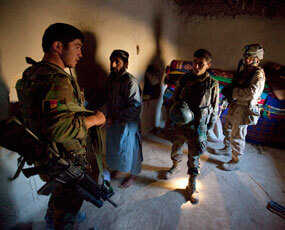WASHINGTON – President Barack Obama’s goal of a “responsible transition” in Afghanistan must serve as the “overall ethical framework for U.S. actions” there, the chairman of the U.S. bishops’ Committee on International Justice and Peace told the national security adviser.
In a Dec. 18 letter to retired Marine Gen. James L. Jones, Bishop Howard J. Hubbard of Albany, N.Y., called for the development of “specific criteria” for troop withdrawal, as well as efforts to help the Afghanis “secure an adequate basis for future political and economic stability.”
He urged that “each course of action taken by the U.S.” in Afghanistan be “weighed in light of the traditional moral principle of ‘probability of success.’“
“In other words, will this action contribute to a ‘responsible transition’ and withdrawal as soon as appropriate and possible?” the bishop said. “Will it improve Afghan security and minimize loss of life? Will it provide an adequate foundation for long-term development?”
Bishop Hubbard said the international policy committee met Dec. 2 to discuss the revised Afghan strategy outlined by Obama the night before in a talk at West Point. At that meeting, the committee “affirmed and extended” the themes of an Oct. 6 letter from the bishop to Jones.
“In the face of terrorist threats, our nation must respond to indiscriminate attacks against innocent civilians in ways that combine a resolve to do what is necessary, the restraint to ensure that we act justly, and the vision to focus on broader issues of poverty and injustice that are unscrupulously exploited by terrorists in gaining recruits,” Bishop Hubbard wrote in both letters.
He reiterated several principles outlined in the earlier letter:
– “Restrain use of military force and ensure that civilians are not targeted.”
– “Address the root causes of terrorism rather than relying solely on military means to solve conflict.”
– Encourage international collaboration to provide humanitarian assistance and rebuild Afghanistan.”
He urged the Obama administration “to continually review the use of military force – whether and when force is necessary to protect the innocent and resist terrorism – to ensure that it is proportionate and discriminate, and to develop concrete criteria for when it is appropriate to end direct U.S. military involvement in Afghanistan.”
“The goal of a ‘responsible transition’ should be carefully defined and limited to permit a timely withdrawal,” the bishop said. “But having initiated military action in Afghanistan, our nation must be committed to fostering good governance, respect for human rights and religious freedom, and economic and agricultural development long after direct military engagement ends.”
Bishop Hubbard said the U.S. bishops “do not have expertise on military strategies” but speak based on “a moral tradition that can inform military decisions and on-the-ground experience in development through Catholic Relief Services.”
CRS is the bishops’ overseas relief and development agency.
“While neither our teaching nor our experience suggest easy answers, they raise key questions with which we must struggle as a nation as we work toward a ‘responsible transition’ in Afghanistan,” he said.
Obama’s plan to add 30,000 troops to the war effort in Afghanistan “focuses our attention on those who risk their lives in the service of our nation,” the bishop said.
“U.S. policy must take into account the growing costs and consequences of continued deployments on military personnel, their families and our nation,” he wrote. “There is a moral obligation to deal with the human, medical, mental health and social costs of military action.”
He also urged that provisions be made “for those who exercise their right to conscientious objection or selective conscientious objection.”


